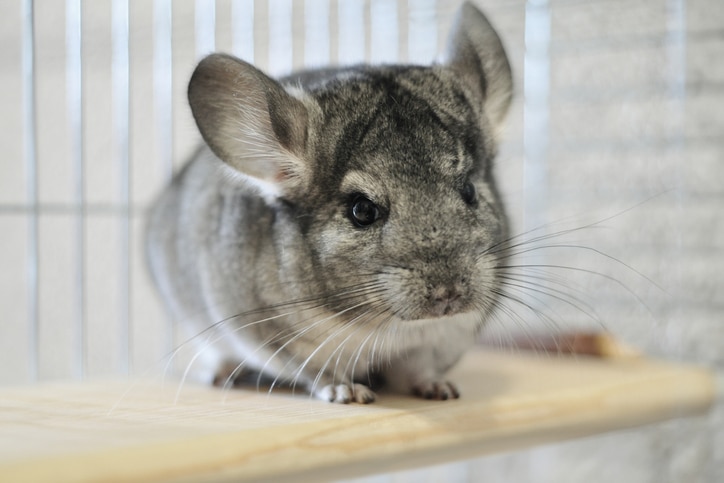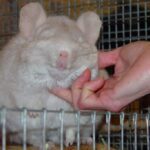Chinchilla Sounds: The 9 Most Common Chinchilla Sounds and What They Mean

Photo by Andrii Baidak/iStock/Getty Images Plus
Your chinchilla is capable of making lots of sounds—from squeaks and coos to barks and cries—and they all mean something different.
Recognizing their sounds not only strengthens your bond, but it also helps you learn more about your chinchilla’s likes and dislikes. Here’s how to understand what your chinchilla’s trying to say.
Key Takeaways:
- Chinchilla sounds are used for different reasons, like happy hops or when they’re in pain.
- Chinchillas are typically quiet pets, so it’s important to pay attention to any sound they make.
- Chinchilla barking is a chinchilla’s alarm system, so if your chinchilla is barking frequently, be sure to contact your vet.
How Many Different Noises Do Chinchillas Make?
“Chinchillas have a small vocal repertoire,” says Marc Silpa, DABVP, a veterinarian at Exotic Animal Veterinary Center in Pasadena, California. Relatively little research has been conducted on the range of chinchilla sounds, he says, so it’s hard to say exactly how many noises they make.
However, Dr. Silpa says research has shown that chinchilla noises can be broken down into four classifications:
- Exploratory: A call that starts high and rapidly drops in pitch, used by chinchillas during exploration to alert others to their location.
- Contact: A low, warbling sound or squeak usually preceded by an exploratory call, made when the chinchilla encounters something or someone they like.
- Bark: A guttural warning chinchillas make when upset or threatened, usually directed at the trigger itself.
- Alarm: A high-pitched shriek indicating distress, usually made when a chinchilla is unable to escape a threat.
Other chinchilla noises may be reserved for interactions between partners or between a mother and her babies. In some cases, specific sounds are associated with distinct behaviors, like happy hops or irritated teeth chattering.
How much noise your pet chinchilla makes will depend on their personality and environment—some even make specific sounds when greeting their person or asking for attention.
Spending quality time with your own chinchilla is the best way to get a sense of their communication style.
Why Is My Chinchilla Barking?
Chinchillas are generally quiet pets, communicating mostly through chirps and squeaks. Most of the noise they make happens during exercise and play at night, since chinchillas are nocturnal animals.
If your chinchilla is making barking noises, though, it’s not something you should ignore.
Barking is the chinchilla’s alarm system, says Sabrina Kong, DVM, a veterinarian at We Love Doodles in San Mateo, California. “It’s common during sudden noises, unfamiliar environments, or if they spot a predator,” she says.
Chinchilla barking sounds have an urgent quality—it’s how they warn each other of potential threats. You should see an exotic vet if barking is a sound your chinchilla makes frequently, to determine if a medical problem is contributing to the noise.
What Do Other Chinchilla Sounds Mean?
Barking is typically the loudest chinchilla noise, but there are a variety of other chinchilla sounds to explore.
Chirping
Chirping is a sound of contentment. “A chinchilla may chirp when they are in a comfortable and playful mood,” says Teresa Manucy, DVM, a telehealth veterinarian in Jacksonville, Florida.
Chattering
Chattering is a sound chinchillas make by clicking their teeth together. It’s usually an indication of irritation, especially when accompanied by barking or hissing. Some chinchillas also chatter when they’re bored. In yet another twist, chattering may be a sign of happiness if their body posture is relaxed—you can think of it like a cat purring.
Teeth Grinding
Unlike chattering, teeth grinding is less of an agitated clicking sound and more of a repetitive grating noise. It usually means your chinchilla is calm and happy. However, its meaning changes if accompanied by a behavior like drooling, which could indicate tooth pain. Dr. Silpa says that both chattering and grinding mean different things for different chinchillas, so it’s important to learn what’s typical for your pet.
Screaming
When a chinchilla produces a sudden scream or shriek, it can be startling—and that’s the point. In some cases, it’s similar to a bark, and it can also be an expression of fear, pain, or frustration.
Kacking
Kacking is a sharp spitting or coughing noise that chinchillas use to let you know they need space. If your chinchilla doesn’t want to be handled, they may kack to let you know to leave them alone.
Chinchillas might also kack at each other, especially during territorial disputes. If they’re still not happy, kacking can progress to barking.
Grunting
Quiet grunting noises are how chinchillas say hello. It’s common for moms to grunt at their kids, similar to cooing. Adult chinchillas may also sound off a quick series of gentle grunts to greet each other or their person.
Hiccups
When a chinchilla becomes particularly agitated or excited, they may give off a series of quick barks that are repeated after a short pause. Dr. Manucy says this can be mistaken for hiccups, when it’s really a sign of distress. If the sound has a wheezing quality to it, see your vet right away to rule out respiratory issues.
Cooing
Dr. Manucy describes cooing as “a low rumble sound from the gut.” It’s a sign of happiness, often exchanged between a mom and her kids, or even chinchilla couples. Your chinchilla might even coo at you to indicate they like the way you’re petting or grooming them.
In any case, coos are more likely if your chinchilla has a cozy home environment with enrichment.
Recommended Products
Should I Worry About My Chinchilla’s Sounds?
Barking or screaming are an indication that something may be wrong. Other noises may be cause for concern, but every pet is different, so get to know your chinchilla well enough to know what’s normal for them.
You can also learn the basics of chinchilla body language to help determine the meaning of the sounds they make. It’ll help you understand whether your chinchilla was simply startled by something or if they might be sick or in pain.
Dr. Silpa recommends seeing an exotic vet if your chinchilla starts behaving abnormally, including making sounds they don’t typically make. Continuous barking (which may indicate unresolved anxiety or another health issue), labored breathing, and teeth grinding paired with drooling should all be considered emergencies, says Dr. Manucy.
FAQs About Chinchilla Sounds
Q: Why do chinchillas scream at night?
A: Chinchillas are most active overnight and during twilight hours because they’re nocturnal. It might be normal for them to make noise at night, but screaming may indicate pain or distress, so see a vet as soon as possible.
Q: How do chinchillas say hello?
A: Chinchillas often greet each other with low warbles and grunting noises. A mother chinchilla may grunt or coo at her kids, while adult chinchillas might say hello with a series of rapid, gentle grunts.
Q: How can I tell if my chinchilla is happy?
A: Chinchillas show they’re happy with excited movements, like wall surfing or popcorning, paired with cooing, chirping, or squeaking sounds, says Dr. Manucy. Wall surfing is when a chinchilla jumps around and bounces off the walls of their cage, while popcorning is a quick jump straight into the air.








